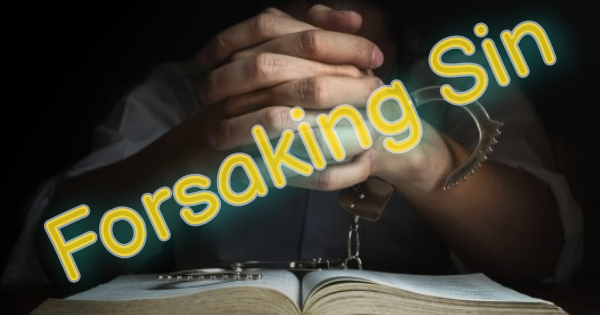
Forsaking Sin — Our Prime Work
A Study Outline
I. Let us not mince words: removing sin and keeping it out of our lives is hard work!
A. Exodus 13:17-22; 14:1-9. Israel was led away from sin toward the Promised Land.
B. If Isreal had been led the easy way out of Egypt [sin], through Philistia, they would have returned to Egypt [sinfulness] quickly when things grew difficult. Exodus 13:17.
C. Even going a far more difficult route, as recorded in Exodus 14:10-12, the Israelites at the Red Sea wanted so much to return to Egypt [sin], for the army of Pharaoh [assaults by Satan and his armies in our lives] was hard on their heels.
D. We likewise must exert enormous energy to avoid falling into sin after being removed from it. Revelation 1:5; James 4:5-10; Ephesians 4:27-28; 6:10-18; I Peter 5:8-10.
E. Our quest is to be without sin, clean and pure.
1. I Corinthians 2:6. Perfect (Strong 5046) = telios, “fully grown and mature, complete”.
2. Ephesians 4:13. Perfect (Strong 5046).
3. Philippians 3:12-15. Perfect (Strong 5046).
4. II Timothy 3:16-17. Perfect (Strong 739) = artios, “fresh, i.e. complete” Vine states that this word stresses that in which nothing is maimed; it refers not only to the presence of all the parts that are necessary for completeness, but also to the further adaptation and aptitude of these parts for their designed purpose.
5. Hebrews 11:40. All of the patriarchs will not be made spirit [perfect; Strong 5048] before us.
6. James 1:4. Perfect (Strong 5046).
7. James 3:2. Perfect (Strong 5046).
8. I Peter 5:10. Perfect (Strong 2675) = katartizo, “to render fit, complete”.
II. This march out of Egypt also typifies the march of mankind through 6,000 years of history — each day for a year — within a sinful world, and the seventh day leaving this sinful age and entering the millennial age.
A. This way of living in perfection and holiness is a narrow, difficult pathway to follow in this age of deception and sin, in which virtually everything is tainted from Godly perfection. Matthew 7:13-14; Luke 13:22-30. Strait (Strong 4728) = stenos, “narrow, from obstacles standing close about”. According to Vine, the strait gate that provides the entrance to eternal life is narrow because it runs counter to natural inclinations; it is filled with anguish and distress at times.
B. As the pathway of Israel from Egypt to Canaan required 40 years of wandering, so must we wander in a wilderness replete with sin and learn to reject evil at every turn. We must reject temptations as Jesus Christ did in the wilderness.
1. Matthew 4:1-11. Wilderness (Strong 2048) = eremos, “lonesome, by implication a waste”.
2. Romans 7:14-25.
The Symbolism of the Exodus
Egypt = sin
Pharaoh = Satan
Pharaoh’s army = demonic followers of Satan
Israel = the chosen ones of God, the saints
Wilderness = troubles and temptations we face in life
Canaan = the heavenly realm of the Father
Jordan River = passing from flesh (or death) to spirit, i.e. the resurrection
Red Sea = receiving the spirit at baptism and the laying on of hands; God’s saving miracle of washing us clean of sin, and of helping us through Satan’s temptations and assaults and granting new hope
II. What is sin?
A. In the Old Testament chata (Strong 2398 and its derivations) is used in most cases, meaning “to miss the mark or path”.
B. In the New Testament hamartano (Strong 264 and its derivatives) is used, meaning the same as chata, “to miss the mark, and so not share in the prize, i.e. to err”.
C. Sin can be any of the following: all cases involve “missing the target” of what we ought to do.
1. Breaking the laws of God. I John 3:4, Romans 5:13: without law there is no sin.
2. Any thought, word, or deed that is unrighteousness. I John 5:17.
3. Whatever is not of faith. Romans 14:23.
4. Wounding of a weak conscience. I Corinthians 8:4-13.
5. Knowing one ought to do something good, but not doing it. James 4:17.
D. The word of God indicates that sin is oftentimes a more comprehensive concept than we may have thought.
1. For example, Samuel told Saul,
“Has the Lord as great delight in burnt offerings and sacrifices as in obeying the voice of the Lord? Behold, to obey is better than sacrifice, and to hearken than the fat of rams. For rebellion is as the sin of witchcraft, and stubbornness is as iniquity and idolatry”. I Samuel 15:22-23.
2. Here we see that sin is an attitude, not just the breaking of a law, which follows the fact that an ungodly attitude normally precedes the breaking of one of His laws … presuming one knows the law, for “… sin is not imputed when there is no law”. Romans 5:13; see also Romans 4:15.
3. Sin can be a set of habit patterns buried within our memory, which we need to root out. See the “hidden sins” described by David in Psalm 19:12.
IV. We can indeed win the battle over sin, because the Eternal Living God is within us, and will help in our battles to escape Egypt, cross the Red Sea, wander with purpose in the wilderness, and at the end of days cross the Jordan River. Romans 7:22-25; 8:31-39.

